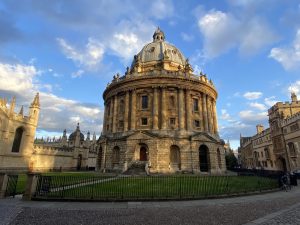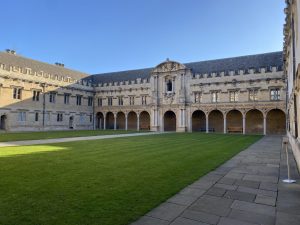by Dr. Robert Yee (Wadham College, University of Oxford)
The University of Oxford convened a two-day conference on the history of political economy, capitalism, and global governance between 7 and 8 April 2025. Co-organised by Patricia Clavin, Aled Davies, and Robert Yee, the conference brought together 15 speakers for a discussion on the future of the field.
In recent years, scholars have assessed the history of global economic governance from multiple perspectives. They have focused on the rise of development initiatives, the impact of wars on the global order, and the tensions between national interests and international cooperation. Together, these works have broadened our understanding of the evolving role of individuals, ideas, and institutions in shaping the world economy.
Our conference reflected on these topics and suggested new directions for the field. We were particularly interested in examining the ways in which the idea of the world economy has been contested, debated, governed and restructured during moments of crisis and change. We also explored the time and temporality of crises, considering the various speeds at which different types of crises, from financial to environmental, proliferated.
The conference consisted of five panels, each with three presentations. Our first panel focused on the role of international organisations in promoting economic development. The presenters showed how ideas of equality, stability, and cooperation motivated different visions of global development from the 1960s to the 1990s.
The second session involved a discussion on economic interdependence during the Cold War. We explored how governments in various parts of the world, from Iceland and Chile to Hungary and Iraq, conceived of their changing role in the global economy.
We began the afternoon sessions with a panel on technocracy. The presentations showed how experts developed statistical methods and legal tools to shape debates over economic policy from the interwar years to the 1970s. How their interventions reshaped different policies, including labor regulation, economic cooperation, and welfare regimes, was a key point of discussion.
The last session of the day critically examined the idea of the so-called American century. We debated how the United States aimed to address challenges to its authority during the twentieth century. The ensuing discussion explored how state officials and private actors often worked within existing institutions to shape imperial, financial, and agriculture governance.
The following day, we examined the evolution of trade and industry from a global perspective. Our discussion assessed competing ideas of free trade and economic liberalism since the Second World War. We observed long-term global deindustrialisation trends from the 1960s to the present.
The conference concluded with a roundtable led by Patricia Clavin and Martin Daunton. We initially probed the interactions between different scales of economic governance, including the global, imperial, regional, and national framework. Future studies of economic governance should also consider less commonly studied scales, such as the Eastern bloc, the Southern cone, and OPEC.
Another common theme was the structure of economic institutions themselves. We noted the many instances in which prominent international organisations have struggled to maintain influence due to intra-national and intra-regional disputes. Whether such institutions should aim to be large and inclusive or small and effective, and how they seek to govern by either votes or consensus, remained a key topic of interest.
Our conversation then shifted to discussion of continuities and ruptures in the prewar and postwar years. We considered the novelty of post-1945 developments, and whether such changes actively drew on precedents from the nineteenth century or interwar period. How governments and institutions adapted to changing economic conditions, such as the oil crisis, also motivated this discussion.
Finally, we discussed the future of the field and, in particular, our audience outside academia. The session was concerned with the extent to which historians should engage with themes that resonate with current events, what it means to be presentist, and how we should write histories tailored to an increasingly global community of scholars and policymakers.
This conference was sponsored by Past & Present, the History & Political Economy Project, the Economic History Society, the Conference for European Studies at Temple University, the Rothermere American Institute, the Oxford Martin School Changing Global Orders project, St John’s College, and Wadham College.
Past & Present was pleased to support this event and supports other events like it. Applications for event funding are welcomed from scholars working in the field of historical studies at all stages in their careers.


